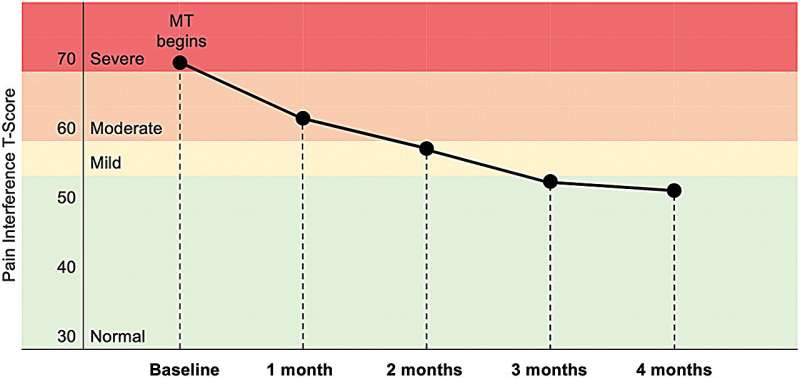This article has been reviewed according to Science X's editorial process and policies. Editors have highlighted the following attributes while ensuring the content's credibility:
fact-checked
trusted source
proofread
Researchers provide recommendations for understanding music therapy's impact on chronic pain

A recent article from a multi-institutional group of researchers provides recommendations for music therapy practice and research among individuals with chronic pain using sickle cell disease as an exemplar condition.
While several studies have demonstrated the benefits of music therapy for addressing acute pain intensity (e.g., pain rated on a 0 to 10 scale), few studies have examined its impact on more meaningful outcomes, such as how much pain interferes with day-to-day life and individuals' ability to participate in social activities despite chronic pain.
The article, entitled "Recommendations for patient-reported outcome use in music therapy practice and research within chronic pain and sickle cell disease populations," provides guidance on how to address these gaps and improve the evidence base for music therapy within this population.
Rather than focusing on outcomes like pain intensity, which fails to speak to the impact of pain on individuals' daily lives or individuals' perceived ability to cope despite the pain, the authors recommend measuring more meaningful outcomes, including pain interference, self-efficacy, pain catastrophizing, and physical, emotional, and social functioning.
The authors provide specific recommendations for which measures to use, how to ensure measures are appropriate to specific chronic pain populations, and how to streamline data collection processes with technology. For example, the authors state that regardless of which measures are used, music therapists and researchers should ensure that measures are (1) relevant to the population's specific needs; (2) appropriate to individuals' developmental and health literacy levels, (3) appropriate to individuals' culture, environment, and socio-economic status; and (4) not overly burdensome.
"Music therapists can play an important role in the effective management of chronic pain because they are able to address multiple factors known to exacerbate pain, such as stress, depressed mood, and loneliness. In addition, music therapists teach people music-based strategies for pain management, and this helps people to feel more in control over their pain," said Joke Bradt, Ph.D., MT-BC, Professor and Director of the Ph.D. Program in Creative Arts Therapies in the Department of Creative Arts Therapies at Drexel University and co-author of the study.
Bradt said, "My research on music therapy for chronic pain management has shown that music therapy is particularly helpful in improving people's pain-related self-efficacy. Self-efficacy is well recognized to play an essential role in effective management of chronic pain."
Much of the article focuses on the implications of music therapy practice and research for people with sickle cell disease. Unlike other chronic pain conditions, chronic pain in sickle cell disease often emerges in adolescence due to the cumulative impact of vaso-occlusion on bones, blood vessels, and brain function.
Samuel Rodgers-Melnick, MPH, MT-BC, a music therapy researcher at University Hospitals Connor Whole Health and lead author of the manuscript added, "with the support of the Kulas Foundation, over the past decade, our research has demonstrated the benefits of music therapy for not only addressing acute pain in the hospital, but also helping people with sickle cell disease better cope with daily pain and have greater confidence in their ability to manage their symptoms."
Rodgers-Melnick said, "To further understand the role of music therapy for people with chronic pain, music therapists and researchers will need to collect data that speak to the impact our work can have on helping these individuals achieve meaningful outcomes."
The paper is published in the Nordic Journal of Music Therapy.
More information: Samuel N. Rodgers-Melnick et al, Recommendations for patient-reported outcome use in music therapy practice and research within chronic pain and sickle cell disease populations, Nordic Journal of Music Therapy (2024). DOI: 10.1080/08098131.2024.2316344



















